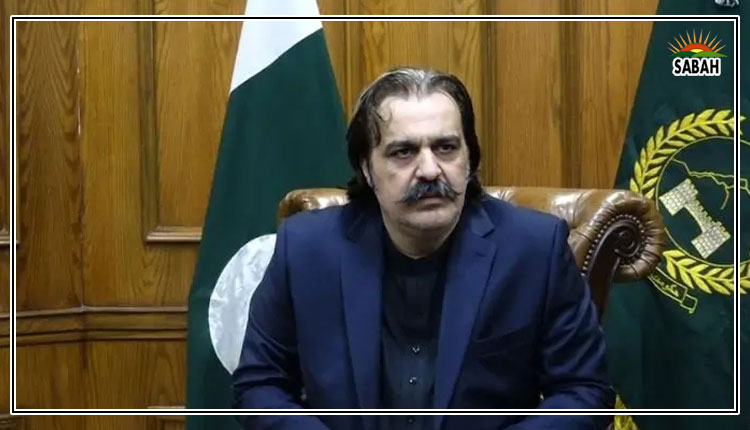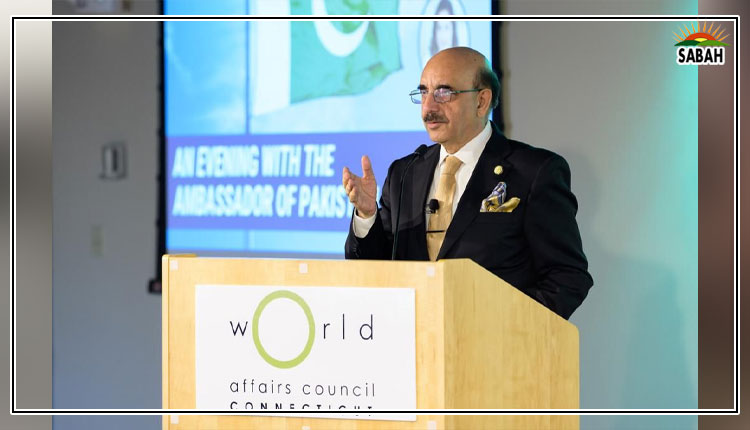Pak-US relations a common good for the two countries, regional stability & int’l peace & security: Sardar Masood Khan
CONNECTICUT, Sep 15 (SABAH): “Pakistan-US relationship is a common good for the two countries, regional stability and international peace and security,” said Pakistan’s Ambassador to the United States Sardar Muhammad Masood Khan.
“We would continue to invest in this relationship,” he said. “Despite all ups and down in the history of the relationship, we have a very strong partnership,” he added.
Ambassador Sardar Masood Khan made these remarks at Connecticut World Affairs Council during his two-day visit to the state of Connecticut. The event was well attended by audience with diverse background including intellectuals, members of think-tank community, entrepreneurs, doctors, engineers, professionals, business leaders and students.
Masood Khan said that Pak-US relationship has a bright future and both the sides were working cohesively to make this relationship work. “We will take it to a higher stature,” he resolved.
The Ambassador said that the two sides would continue to concentrate on security dimensions of their relationship including counter-terrorism, stabilization of situation in Afghanistan, weaning the people of the region away from violent extremism and would continue to make efforts for promoting peace and security.
“At the same time,” he said, “both the states are working to upgrade the relationship in the areas of clean and green energy, green technologies, climate resilience, health, education, and trade and investment.
“Trade between the two countries is good but it should be better. We should not sit on our laurels. That is why it is important to focus on these non-security issues,” he added.
Masood Khan said that Pakistani-American community was serving as a catalyst and a strong connective tissue between Pakistan and the United States. He said that Pakistani diaspora, estimated to be nearly one million, comprised doctors, engineers, IT entrepreneurs, professionals and successful business leaders.
“Pakistani-American community has created a niche for them in the United States in political and professional circles,” he observed.
He said that it was his second visit to Connecticut, the first being two decades ago as a Counsellor. He noted the impressive GDP of the state with small population and a dynamic leadership.
Pointing out low figures of bilateral trade, the Ambassador said that, “trade volume between Pakistan and Connecticut is very small. We need to upgrade this relationship in trade and investment,” he emphasized.
“It is important to take US investors from Connecticut to Pakistan. Connecticut has cutting edge technologies. The leadership of Connecticut has assured that they would connect us to the relevant departments,” he said.
“In addition to the government departments, we would like to work directly with the private sector,” he added.
Masood Khan said that the leading Pakistani-American professionals, community leaders and anchors could help in building a new phase of relationship between Connecticut and Pakistan.
Talking about Pakistan’s national priorities in wake of changing international landscape, the Ambassador recounted political stability, economic viability and being part of a new technological revolution as the foremost priorities of the country.
“Political stability is imperative for putting Pakistan on-track for higher level of development,” he said.
“Once we have reached that stage of viability, we must take off because Pakistan has very strong macroeconomic fundamentals for becoming one of the largest and one of the best economies in the world,” he added.
He predicted that digitization revolution would transform concepts about economies and polities.
“Another objective which was not just for Pakistan but for the entire world, was that we should try to build harmony amongst nations and within nations,” he said.
Noting increased bandwidth for Pakistan in Washington DC during past one year, he said the two countries needed to work on perception management. “Perceptions are important to develop relations,” he said.
On Pakistan-China relations, the Ambassador said that “our relationship with China is not and cannot be at the expense of our relationship with the United States.”
“Pakistan can also facilitate communication between Beijing and Washington, if required. We want to be very constructive,” he added.
On US relations with India and the Indo-Pacific strategy, the Ambassador said that Pakistan advocates restoration of strategic equilibrium in South Asia for sustainable peace and security of the region.
“An estimated $6 trillion mineral treasure trove of Pakistan is ripe for leading US firms to invest and reap dividends of a lucrative market of the region,” said Sardar Masood Khan.
“Our focused approach on improving ease of doing business, ensuring business friendly regulatory regime and providing one-window solutions guarantees profitable business ventures to leading US and other foreign investors,” he said. “Time has come to transform our decades long relationship into a multifaceted economic partnership for the mutual benefit of our people and the region,” he continued.
Ambassador Masood Khan made these remarks during his meeting with a group of State Senators and Representatives of Connecticut State legislature in Hartford on last day of his two-day visit to the state. The group included State Senator Tony Hwang, State Senator Henri Martin, State Rep. Tim Ackert, State Rep. Tom Delnicki, State Rep. Mark Anderson, State Rep. Cooley, and Rocky Hill Mayor Lisa Marotta.
“The world is facing a huge challenge of supply chain disruptions in critical, high-tech manufacturing. Pakistan offered proven reserves of mineral resources required for manufacturing of high-tech components like chips and semiconductors,” he said. He said that the leading economies of the world were focusing on friend-shoring and on-shoring of high-tech manufacturing that required sustainable and dependable supply of raw materials and “Pakistan could be an ideal source for that,” he added.
“We welcome investments in mining sector and we offer a new incentivization regime for investment in our untapped reserves of minerals and rare-earth,” Masood Khan said.
Masood Khan highlighted that Pakistan-United States relations were following an upward trajectory. The commitment of the leadership of the two countries towards this decades-long relationship has induced a new momentum during last one year and both sides had consciously choose to focus on cooperation in non-security areas along with security cooperation. He said that two sides have had substantive, high-level dialogues in critical areas including health, renewable energy, climate change, counter-terrorism, anti-narcotics. The investment by US-based IT firms and VC have played an important role in nurturing tech-ecosystem in Pakistan which has grown bullish. “US VCs and Unicorns have made substantive investments in Pakistan’s tech start-ups,” he added.
He also highlighted agriculture, health, manufacturing, pharmaceutical, IT and fintech as low hanging fruits for US investors and businesses.
“Connecticut has a vibrant economy, yet its trade with Pakistan remains far below the potential,” he said underscoring the need to focus more on trade and investment opportunities to capitalize upon the existing potential.
The lawmakers evinced keen interest in further enhancing cooperation in trade, investment and people-to-people linkages and resolved to explore opportunitt for exchange of trade missions and business delegations. They also appreciated the contributions being made of Pakistani-American community in Connecticut.
Discussing educational linkage, the lawmakers expressed the hope to see greater number of Pakistani students in universities and colleges of Connecticut to augment people-to-people linkages, especially the builders and future leaders of the two countries. “Lawmakers in lead, supported and seconded by enterprising business community, would propel our existing relations to new heights,” Masood Khan said.












